Unit 11 How was your school trip The first period
七年级英语下册Unit 11 How was your school trip超全重要短语和句子(英汉対译)
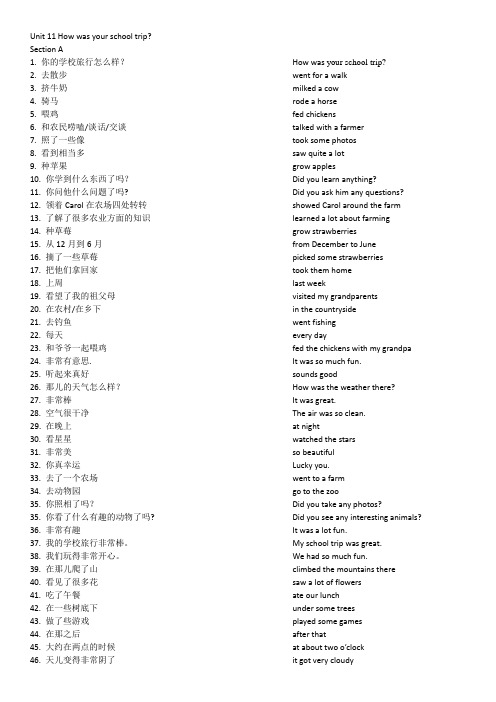
Unit 11 How was your school trip?Section A1. 你的学校旅行怎么样?How was your school trip?2. 去散步went for a walk3. 挤牛奶milked a cow4. 骑马rode a horse5. 喂鸡fed chickens6. 和农民唠嗑/谈话/交谈talked with a farmer7. 照了一些像took some photos8. 看到相当多saw quite a lot9. 种苹果grow apples10. 你学到什么东西了吗?Did you learn anything?11. 你问他什么问题了吗? Did you ask him any questions?12. 领着Carol在农场四处转转showed Carol around the farm13. 了解了很多农业方面的知识learned a lot about farming14. 种草莓grow strawberries15. 从12月到6月from December to June16. 摘了一些草莓picked some strawberries17. 把他们拿回家took them home18. 上周last week19. 看望了我的祖父母visited my grandparents20. 在农村/在乡下in the countryside21. 去钓鱼went fishing22. 每天every day23. 和爷爷一起喂鸡fed the chickens with my grandpa24. 非常有意思. It was so much fun.25. 听起来真好sounds good26. 那儿的天气怎么样?How was the weather there?27. 非常棒It was great.28. 空气很干净The air was so clean.29. 在晚上at night30. 看星星watched the stars31. 非常美so beautiful32. 你真幸运Lucky you.33. 去了一个农场went to a farm34. 去动物园go to the zoo35. 你照相了吗?Did you take any photos?35. 你看了什么有趣的动物了吗? Did you see any interesting animals?36. 非常有趣It was a lot fun.37. 我的学校旅行非常棒。
初中英语七年级下册 Unit11How was your school trip
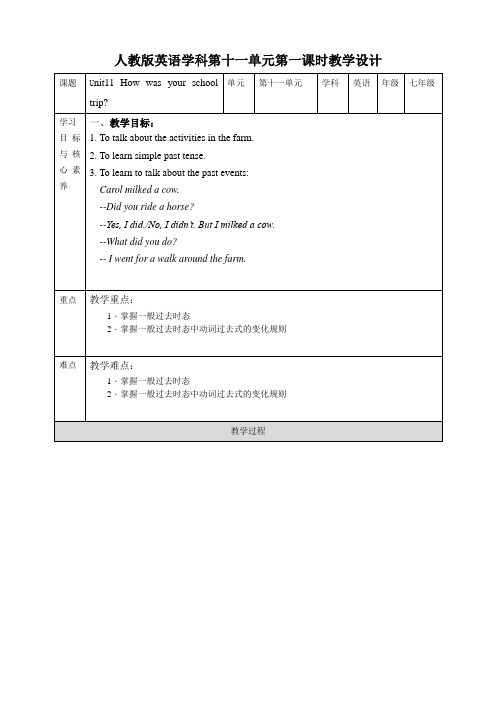
人教版英语学科第十一单元第一课时教学设计课题U nit11 How was your schooltrip?单元第十一单元学科英语年级七年级学习目标与核心素养一、教学目标:1. To talk about the activities in the farm.2. To learn simple past tense.3. To learn to talk about the past events: Carol milked a cow.--Did you ride a horse?--Yes, I did./No, I didn’t. But I milked a cow. --What did you do?-- I went for a walk around the farm.重点教学重点:1.掌握一般过去时态2.掌握一般过去时态中动词过去式的变化规则难点教学难点:1.掌握一般过去时态2.掌握一般过去时态中动词过去式的变化规则教学过程课堂小结Summary1.重点单词:milk,cow,horse,feed,farmer,quite2.重点短语:go for a walk, milk a cow, ride a horse, feed chickens, talk witha farmer, take some photos, quite a lot3.重点句式:—Did you see any cows?—Yes, I did. I saw quite a lot.—Did you ride a horse?—No, I didn't. But I milked a cow.板书go for a walk, milk a cow, ride a horse, feed chickens, talk with a farmer, take some photos, quite a lot。
人教版unit_11_How_was_your_school_trip___reading
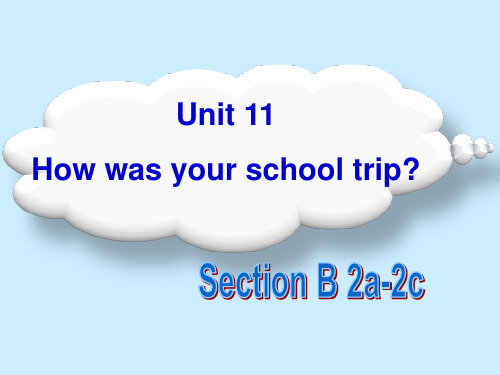
课堂评价——学科班长总结
精彩小组 掌握本课的单 终用英语完成老师要 求的各项任务 善于提问,富有创新 精神 精彩同学
I……
They....
go fishing
visit a museum
went fishing
climb mountains go to the zoo visited a museum visit a fire station climbed mountains ride a horse went to the zoo visited a fire station
climb mountains go fishing
go to the zoo
visit a museum
ride a horse
visit a fire station
What do you do on weekends? What did you do last weekend? What do they do every day? What did they do yesterday?
彼得:你好,埃里克。你上星期的旅行如何? 埃里克:特棒。我探望了乡下的爷爷奶奶。 彼得:喔,很好嘛。你都干什么了? 埃里克:我每天去钓鱼,和爷爷奶奶一道喂 鸡。那真是蛮好玩的。 彼得:听起来真好。那边的天气如何? 埃里克:天气好极了,空气是那么清新。夜 晚我会看星星,它们是那么美丽。 彼得:你真幸运。
1. Remember the key words and expressions in Unit 11 and use them freely. 2. Can read and retell with the text by reading and retelling. 3. Love trip and enjoy life.
人教新目标(Go for it)版Unit 11 How was your school trip-
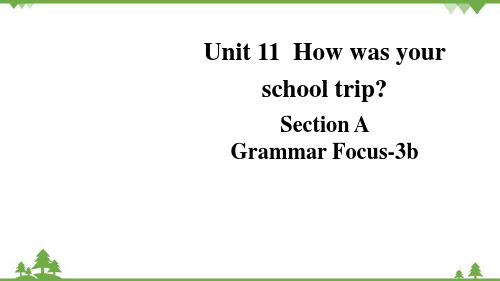
Irregular verbs
do is are have eat buy
did was were
had ate bought
定义 时间标志词
一般过去 时(一)
构成(动词的规则性和 不规则性变化) 句式结构
定义
一般过去时表示过去某个时间或某一段时间内发生 的动作或存在的状态,也可以表示过去的习惯或经 常发生的动作。一般过去时常和表示过去的时间状 语连用。
much fun.
A. have
B. had
C. are having
D. will have
Susan _____ a birthday card for me two days ago.
A. will buy
B. bought
C. buys
D. is buying
—_____ you _____ TV yesterday evening?
花
come out 意为“出现;露出”
We _a_t_e_ (eat) our 在lun含c有h 宾un语d从er句so的m主e 从tr复ee合s a句n中d , _p_l_a_y_e_d (play) some若g主am句e的s 时af态ter为t一ha般t.过B去ut时a,t a从bo句ut two o’clock, it _g_o_t通(g常et要) v用er相y应cl的ou过dy去a时n态d w。e _w_o_r_r_ie_d_ (worry) it would rain. Luckily, it _d_i_d_n_’_t
c.
或
后,-ed读
。如wanted,
needed.
⑤动词过去式的不规则变化规律:
类别
Unit 11 How was your school trip人教版新目标七年级下册英语优秀教学设计 初一教案有教学反思
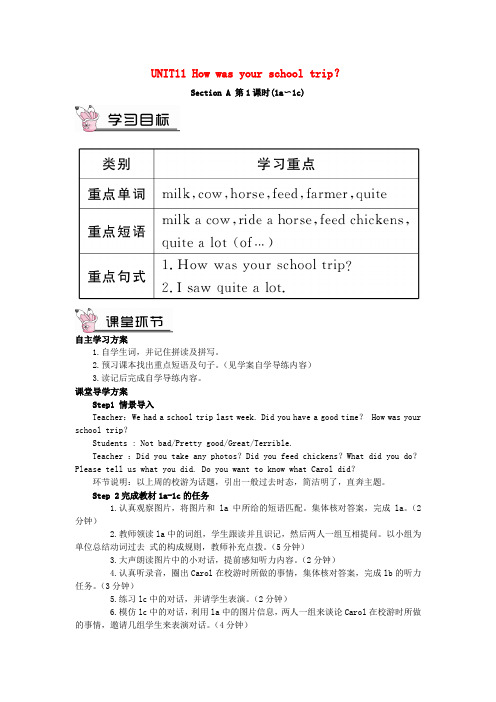
UNIT11 How was your school trip?Section A 第1课时(1a〜1c)自主学习方案1.自学生词,并记住拼读及拼写。
2.预习课本找出重点短语及句子。
(见学案自学导练内容)3.读记后完成自学导练内容。
课堂导学方案Step1 情景导入Teacher:We had a school trip last week. Did you have a good time? How was your school trip?Students : Not bad/Pretty good/Great/Terrible.Teacher :Did you take any photos?Did you feed chickens?What did you do?Please tell us what you did. Do you want to know what Carol did?环节说明:以上周的校游为话题,引出一般过去时态,简洁明了,直奔主题。
Step 2完成教材1a-1c的任务1.认真观察图片,将图片和la中所给的短语匹配。
集体核对答案,完成la。
(2分钟)2.教师领读la中的词组,学生跟读并且识记,然后两人一组互相提问。
以小组为单位总结动词过去式的构成规则,教师补充点拨。
(5分钟)3.大声朗读图片中的小对话,提前感知听力内容。
(2分钟)4.认真听录音,圈出Carol在校游时所做的事情,集体核对答案,完成lb的听力任务。
(3分钟)5.练习lc中的对话,并请学生表演。
(2分钟)6.模仿lc中的对话,利用la中的图片信息,两人一组来谈论Carol在校游时所做的事情,邀请几组学生来表演对话。
(4分钟)参考案例:A:Did Carol take any photos?B:Yes,she did. /No,she didn’t.7.小结训练。
(4分钟)(1)— What did Sam do on the farm?—He B chickens.A feedsB fedC grows(2)— C you to the zoo last Sunday?—No,I didn'.A. Do;goB. Are;going C . Did;go环节说明:听说结合,第一时间向学生传达语言目标,结对对话练习和小结训练,使语言目标得以强化。
人教七下Unit 11 How was your school trip?知识点

Unit 11 How was your school trip?Section A1. How was your trip yesterday?(1)本句为询问某事情况的常用句型,其中was是be动词的过去式,如果询问当前的情况则be动词用is。
其答语常用:It was great! (好极了) / It was OK.(还可以)/ It wasn’t good.(不好。
)/ All right.(很好。
)/ It was not bad.(还不错。
)等。
How + be+…?相当于What + be +… + like? 例如:-How was her holiday?-It was not bad.(2)How是疑问副词,意为“如何,怎样”,常用来引导特殊疑问句来询问方式、程度、状况等。
常用于以下交际用语中:1)How is/are +sb. ? 用来询问人的身体、工作、学习或生活等的状况。
例如:-How are you? -Fine, thank you.2)How is/are +sth.?用来询问某物或者某事的状况如何。
例如:How is your work?3)How do you do? 并不表示疑问,是第一次见面时的问候语,回答仍用此句。
例如:How do you do? ---How do you do?4)How is it going?/ How is everything going? 用来询问事情进展如何。
例如:How is it going? Very well./ Not too bad./just so so.2. feed chickenfeed 作及物动词,意为“喂养,饲养”,其后常接表示动物名称的词作宾语。
例如:My father’s job is to feed the animals.拓展:(1)feed..to…意为“把……喂给……吃”。
feed后接饲料或者食物名称做宾语,to为介词,其后一般接动物或者小孩等名词表示对象。
人教版七年级下英语Unit 11 How was your school trip单元知识复习总结

Unit 11How was your school trip?重点词汇重点短语Section A 1.milk a cow给奶牛挤奶2.ride a horse骑马3.feed chickens喂鸡4.quite a lot (of...)许多……5.in the countryside在乡下;在农村6.go for a walk去散步7.talk with a farmer 与一位农民交谈8.take some photos拍一些照片9.grow apples种苹果10.show sb.around带某人参观11.learn a lot about...学习许多关于……12.pick some strawberries采摘一些草莓13.last week上周14.go fishing去钓鱼15.so much fun如此多的乐趣16.at night在夜晚17.school trip学校旅行18.climb the mountains爬山19.come out 出现Section B 20.fire station消防站21.all in all总的说来22.be interested in对……感兴趣23.go to the zoo去动物园24.visit a museum参观博物馆25.climb a mountain爬山26.buy sth.for sb.为某人买某物27.not...at all一点儿也不28.along the way沿途,一路上29.teach sb.how to do sth.教导某人如何做某事30.slow train慢火车31.gift shop礼品商店32.an exciting day令人兴奋的一天33.at the museum在博物馆34.draw pictures画画35.see some painting看见一些画重点句型1.How was your school trip?/What was your school trip like?你(们)的学校郊游怎么样?2.The farmer showed Carol around the farm.这位农民带着卡萝尔参观了农场。
新人教版七年级英语下册Unit 11 How was your school trip Sectio

1b. Listen and answer the questions.
4.How to ……疑问句+不定式? They want to know how to make a model plane? 他们想知道如何制作飞机模型?(报纸) 5.take photos=take pictures照相 take a photo /photos of sb 给某人拍照 6.buy——过去式:bought 买 buy sb sth =buy sth for sb 给某人买某物 buy some lovely gift for my parents。 点睛:p74 7. lovely 形容词:可爱的 报纸:Helen has a lovely dog and she likes it very much。 Helen 有一个可爱的狗狗,她非常喜欢它。
2.It is +adj+to do sth 做某事很怎么样。 3.any 用于否定句,此句有didn’t)
(7)There were also too many people and I couldn’t really see or hear the guide. (人也太多而且我也不能看见或听见向导说的 话。)
expensive
3a. Look at the pictures of Bob’s school trip. Complete his diary entry.
2023年人教版七年级英语下册《Unit 11 How was your school trip》句
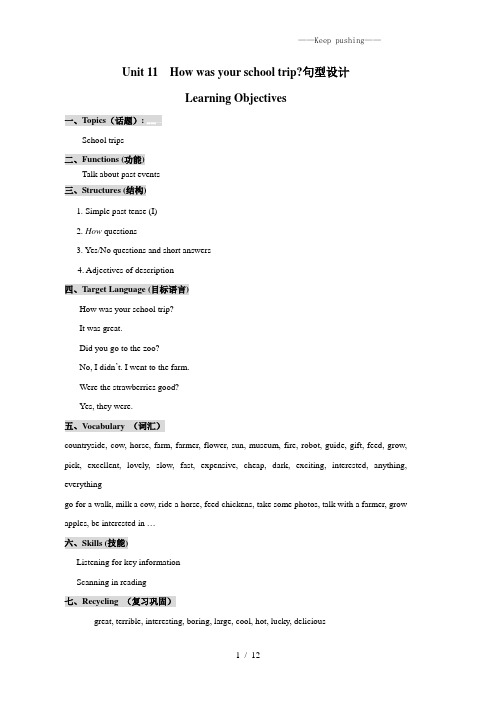
Unit 11 How was your school trip?句型设计Learning Objectives一、Topics(话题):School trips二、Functions (功能)Talk about past events三、Structures (结构)1. Simple past tense (I)2. How questions3. Yes/No questions and short answers4. Adjectives of description四、Target Language (目标语言)How was your school trip?It was great.Did you go to the zoo?No, I didn’t. I went to the farm.Were the strawberries good?Yes, they were.五、Vocabulary (词汇)countryside, cow, horse, farm, farmer, flower, sun, museum, fire, robot, guide, gift, feed, grow, pick, excellent, lovely, slow, fast, expensive, cheap, dark, exciting, interested, anything, everythinggo for a walk, milk a cow, ride a horse, feed chickens, take some photos, talk with a farmer, grow apples, be interested in …六、Skills (技能)Listening for key informationScanning in reading七、Recycling (复习巩固)great, terrible, interesting, boring, large, cool, hot, lucky, delicious八、教材分析本单元的话题是谈论学校郊游,要求学生学会使用一般过去式讲述过去发生的事情,学会用一般过去时写日记。
2020年人教版七年级英语下册Unit11 How was your school trip 要点详解
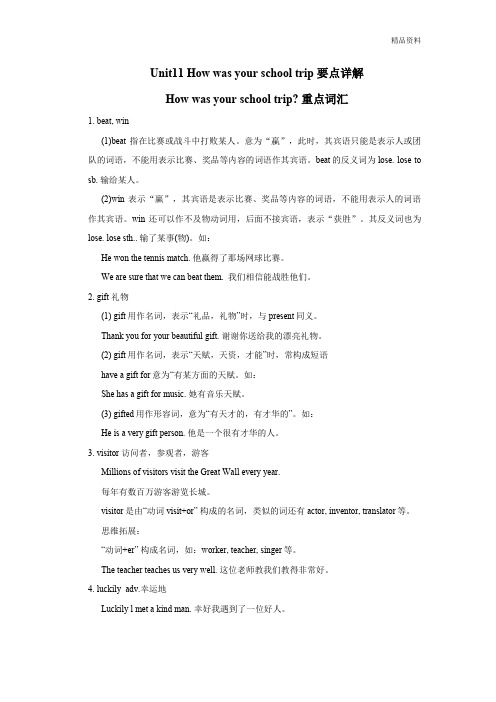
Unit11 How was your school trip 要点详解How was your school trip? 重点词汇1. beat, win(1)beat指在比赛或战斗中打败某人。
意为“蠃”,此时,其宾语只能是表示人或团队的词语,不能用表示比赛、奖品等内容的词语作其宾语。
beat的反义词为lose. lose to sb. 输给某人。
(2)win表示“赢”,其宾语是表示比赛、奖品等内容的词语,不能用表示人的词语作其宾语。
win还可以作不及物动词用,后面不接宾语,表示“获胜”。
其反义词也为lose. lose sth.. 输了某事(物)。
如:He won the tennis match. 他赢得了那场网球比赛。
We are sure that we can beat them. 我们相信能战胜他们。
2. gift 礼物(1) gift用作名词,表示“礼品,礼物”时,与present同义。
Thank you for your beautiful gift. 谢谢你送给我的漂亮礼物。
(2) gift用作名词,表示“天赋,天资,才能”时,常构成短语have a gift for意为“有某方面的天赋。
如:She has a gift for music. 她有音乐天赋。
(3) gifted用作形容词,意为“有天才的,有才华的”。
如:He is a very gift person. 他是一个很有才华的人。
3. visitor 访问者,参观者,游客Millions of visitors visit the Great Wall every year.每年有数百万游客游览长城。
visitor是由“动词visit+or”构成的名词,类似的词还有actor, inventor, translator等。
思维拓展:“动词+er”构成名词,如:worker, teacher, singer等。
The teacher teaches us very well. 这位老师教我们教得非常好。
2020年人教版新目标七下Unit 11 How was your school trip 单词和课
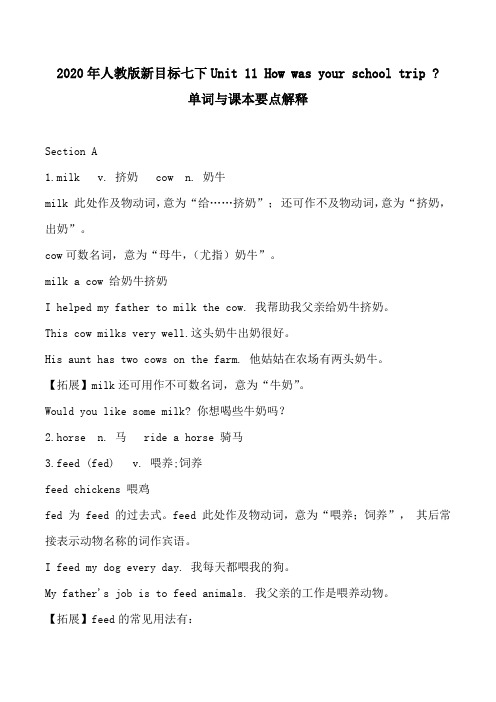
2020年人教版新目标七下Unit 11 How was your school trip ?单词与课本要点解释Section Ak v. 挤奶 cow n. 奶牛milk 此处作及物动词,意为“给……挤奶”;还可作不及物动词,意为“挤奶,出奶”。
cow可数名词,意为“母牛,(尤指)奶牛”。
milk a cow 给奶牛挤奶I helped my father to milk the cow. 我帮助我父亲给奶牛挤奶。
This cow milks very well.这头奶牛出奶很好。
His aunt has two cows on the farm. 他姑姑在农场有两头奶牛。
【拓展】milk还可用作不可数名词,意为“牛奶”。
Would you like some milk? 你想喝些牛奶吗?2.horse n. 马 ride a horse 骑马3.feed (fed) v. 喂养;饲养feed chickens 喂鸡fed 为 feed 的过去式。
feed 此处作及物动词,意为“喂养;饲养”,其后常接表示动物名称的词作宾语。
I feed my dog every day. 我每天都喂我的狗。
My father's job is to feed animals. 我父亲的工作是喂养动物。
【拓展】feed的常见用法有:①feed sth.to sb. /sth. 把某物喂给某人/某物Please feed some grass to the cow. 请给这头奶牛喂些草。
She fed milk to the baby. 她给婴儿喂了牛奶。
②feed on 以……为生,以……为食Sheep feed on grass. 绵羊以草为食。
③feed…on/with…用……喂……He feeds the dog on meat. 他用肉喂狗。
4.farmer n. 农民;农场主farm名词,意为“农场”;动词意为“耕种;干农活”。
人教版pep英语七年级下册-Unit-11-单元分析

比分析能力。
品店的东西很贵。
分课时教学目标
课时 period 1
period 2
Period 3 Period 4
Period 5
分课时教学目标
学生能够: 1.了解卡罗尔在旅行中做了什么的详细信息,并复述卡罗尔的 旅行经历; 2.正确使用目标语言进行关于旅行的对话。
1.获得埃里克、简和托尼旅行的详细信息; 2.用目标语言复述和谈论这些旅行; 3.从更多方面分享我们自己的旅行,并思考我们可以从旅行中 得到什么。
作业设计 根据农场旅行vlog编写对话(学习理解+应 用实践) 描述自己的一段令人难忘的旅行经历(应 用实践+迁移创新)
利用静态雕像进行故事接龙(应用实践+迁 移创新)
按要求编写和Jim的对话(应用实践+迁移 创新)
写一篇旅行日记(应用实践)
教学内容 语篇类型
Period 4
2b两篇日记 (应用文)
What
Why
How
Helen和Jim的日记,记录了 2b两篇日记是两个人 因为是日记体裁,所以这两
对待同一场学校旅行两人不 对同一场学校旅行截 个语篇均使用第一人称和一
同的感受和评价。
然不同的记录与感受。 般过去时按照旅行发展的顺
Helen认为参观科学博物馆 启发学生对于看待事 序去展开描述,Helen与Jim
行很糟糕,觉得火车很慢车 写作。
lovely, exciting,
厢里面很热,博物馆大且无
terrible, hot, boring等
趣,因为他对机器人不感兴
形成的对比,这不仅考查了
趣。馆内很暗所以他没拍照。
学生对篇章的理解,培养了
而且人很多,他看不清也听
2019版七年级英语下册 Unit 11 How was your school trip教案 (新版)人教新目标版

课 题
Unit 11How was your school trip?
课时
第一课时Section A(1a-2d)
课型
New
教学目标
知识
目标
1.学习并掌握下列词汇:
milk, cow, horse, feed, farmer, quite, anything, grow, farm, pick, excellent, countryside
8.许多的
Ⅲ.单项选择
(B)1. —_______
—It was pretty good.
A. How did you do it?
B. How was your trip?
C. What did you do?
D. Where did you go?
(B)2. —_______you buy a new book yesterday?
通过小组活动,增强学生学习积极性,培养学生团队协作精神。
续表
教学环节
教师活动
学生活动
备课札记
Step 7
Summarize
1. Guide the students to summarize the new words, short phrases and sentences in this class.
2. Ss ask and answer questions in pairs.
通过利用相关信息差进行口语结对活动,在交流信息过程中,进行真实的交际问答活动。
Step 5
Role-Play (2d)
1. Let Ss learn about the background of the conversation.
人教版七年级英语下册教案Unit 11 How was your school trip第一课时

Unit 11How was your school trip?单元目标第一课时Section A (1a-2d) 课时目标show sb. around 带领某人参观learn about 了解,学习grow strawberries 种草莓from...to... 从……到……(时间/地点) pick strawberries 摘草莓in the countryside 在乡下;在农村go fishing 去钓鱼so much fun 非常有趣,很开心at night 在夜里,在晚上重点句子1.—Did you see any cows? 你看见奶牛了吗?—Yes, I did. I saw quite a lot. 是的,我看见了。
我看到了很多头奶牛。
2.—Did you ride a horse? 你骑过马吗?—No, I didn't. But I milked a cow. 不,我没有。
但是我给奶牛挤了奶。
重点句子3.The farmer showed Carol around the farm.这位农场主带着卡罗尔参观了农场。
4.The farmers grow strawberries from December to June. 农民从十二月到六月种植草莓。
5.Carol picked some strawberries and took them home. 卡罗尔采摘了一些草莓并带回了家。
6.—How was your trip? 你的旅行怎么样?—It was excellent. 非常棒。
7.—What did you do? 你做了什么?—I went fishing every day. 我每天都去钓鱼。
8.It was so much fun. 那真是太好玩了。
教学难点让学生初步了解一般过去时的用法,并学会谈论过去的事情;掌握一些关于农场的动词短语自主学习根据句意及音标提示写出单词及其汉语意思。
Unit 11 How was your school trip(讲义及答案)
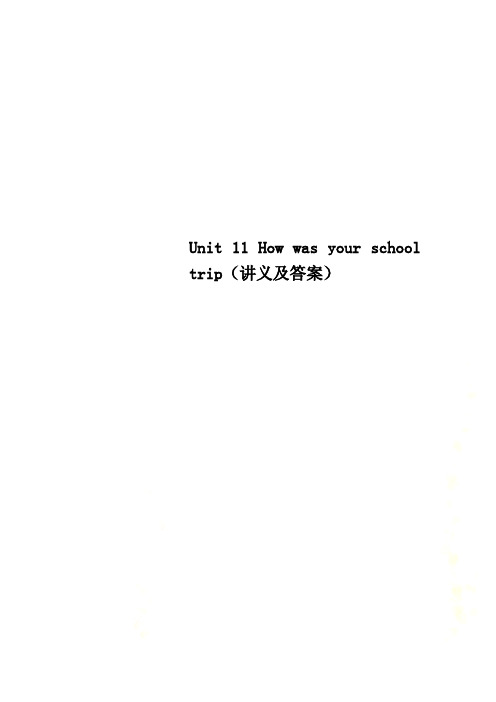
Unit 11 How was your school trip(讲义及答案)Unit 11 How was your school trip?(讲义)Part 1 Words and Expressionsmilk /mɪlk/ v. 挤奶cow /kaʊ/ n. 奶牛milk a cow 挤奶horse /hɔː(r)s/ n. 马ride a horse 骑马feed /fiːd/ v.(fed /fed/)喂养;饲养feed chickens 喂鸡farmer /'fɑː(r)mə(r)/n. 农民;农场主quite /kwaɪt/ adv. 相当;完全quite a lot (of…) 许多anything /'enɪθɪŋ/pron.(常用语否定句或疑问句)任何东西;任何事物grow /grəʊ/ v. (grew/ɡruː/)种植;生长;发育farm /fɑː(r)m/ n. 农场v. 务农;种田pick /pɪk/ v. 采;摘excellent /'eksələnt/adj. 极好的;优秀的countryside /'kʌntrisaɪd / n. 乡村;农村in the countryside 在乡下;在农村yesterday /'jestə(r)di/adv. 昨天flower /'flaʊə(r)/n. 花worry /'wʌrɪ/ v. & n. 担心;担忧luckily /'lʌkɪli/ adv. 幸运地;好运地sun /sʌn/ n. 太阳museum /mjuː'ziəm/n. 博物馆fire /'faɪə(r)/n. 火;火灾fire station 消防站painting /'peɪntɪŋ/n. 油画;绘画exciting /ɪk'saɪtɪŋ/adj. 使人兴奋的;令人激动的lovely /'lʌvli/ adj. 可爱的expensive /ɪk'spensɪv/ adj. 昂贵的cheap /tʃiːp/ adj. 便宜的;廉价的slow /sləʊ/ adj. 缓慢的;迟缓的fast /fɑːst/ adj. & adv. 快地(的)slow & fastadj. 缓慢的;迟缓的adj.& adv. 快地(的)adj.a slow driver a fast walkerI missed the fast train and had to get the slow one.adv.slowly & fastCan you speak slowly? The boy runsfast.interesting adj. 感兴趣的be interested in 对……感兴趣I am interested in music and my brother is interested in sports. We had a great time on the farm yesterday. We were interested in milking the cow.be interested in 主语通常是人,接动词时用动词的-ing 形式。
- 1、下载文档前请自行甄别文档内容的完整性,平台不提供额外的编辑、内容补充、找答案等附加服务。
- 2、"仅部分预览"的文档,不可在线预览部分如存在完整性等问题,可反馈申请退款(可完整预览的文档不适用该条件!)。
- 3、如文档侵犯您的权益,请联系客服反馈,我们会尽快为您处理(人工客服工作时间:9:00-18:30)。
Where did you go on vacation? I went to Beijing. Oh, really? Did you visit the Great Wall? Yes, I did. / No, I didn’t.
Where did you go on vacation?
I went to New York City.
Where did they go on vacation? They went to Beijing / … .
Hainan islandຫໍສະໝຸດ The mountains
Macau
(澳门)
museum [mju:'zim] 博物馆 Where did you go on vacation? I visited the museum. 恐龙 dinosaur Where did you go on vacation? really [' rili ] 真的 I went to the beach. Oh, really? Did you swim? Yes, I did. / No, I didn’t.
暑假 寒假
Where did you go on vacation? I went to the zoo.
Where did you go on vacation? I went to Beijing / Tian’an Men Square.
桂林山水甲天下
Where did you go on vacation? I went to Guilin.
Tokyo
Where did you go on vacation? I went to Tokyo. Oh, really? Did you go to Mount Fuji ?
Yes, I did. / No, I didn’t.
Beijing
the Great Wall
Toronto
上海东方明珠广播电视塔
watch---watched, practice--- practiced study—studied, stop---stopped 2.不规则动词的过去式: am---was, is---was, are--- were, have--- had , write--- wrote, go-- - went, do--- did
['sentrl]Central Park Oh, really? Did you go to Central Park? Yes, I did. / No, I didn’t.
美国/纽约/中央公园
Where did you go on vacation?
I went to the park.
Oh, that’s nice. Did you go boating? Yes, I did. / No, I didn’t.
Welcome to this class!
Unit 11 How was your schooltrip?
Title:
Unit 11 How was your school trip?
在度假
on vacation = on holiday summer vacation winter vacation
Vacation
Names
place park
activity went boating visited Big Ben visted the Great Wall
Lucy Li Ming Tom
London
Beijing
A: Where did you go on vacation? B: I went to Hangzhou. A: Oh, really? Did you visit the West Lake? B: Yes, I did.
Report:
In my group, Belina went to Hangzhou, and she visited the West Lake. went to …, but he /she didn’t … …
Vacation
Names
place park
activity didn’t go boating visited Big Ben
Where did you go on vacation? I went to Chairman Mao’s hometown.
camp [æ] n.野营;营地
summer camp 夏令营
Where did you go on vacation? I went to summer camp.
New York City
Lucy Li Ming
London
Beijing
Hangzhou
Tom
Belina
didn’t viste the Great Wall
visited the West Lake
一般过去时: 定义:表示过去某个时间发生的动作或存 在的状态,常和表示过去的时间状 语连用,如yesterday, last night, in 1990, two days ago 等。 结构: “主语+动词的过去式”
1.规则动词的过去式:
1)加--ed 2)以不发音e结尾的加d 3)以辅音字母加y结尾的,变y为i加 ed 4)末尾只有一个辅音字母的重读闭音节,双写该 辅音字母加ed
纽约市
Where did you go on vacation? I went to New York City.
Where did she go on vacation? She went to New York City.
Where did he go on vacation? He stayed at home.
The CN Tower:国家电视塔(canada national tower), 多伦多的标志性建筑。加拿大国家十大景观之一,世界最 高的独立式建筑物。电视塔高达553.3米,建于1976年, 147 层 。上海东方明珠广播电视塔,亚洲第一、世界 第三的广播电视塔,高468米。1994年10月1日建成。
London
Where did you go on vocation? I went to Hangzhou /…. Did you go to the West Lake? Yes, I did. / No, I didn’t.
Please interview your group members (with“Where did you go on vacation? Did you…”) about their vacations and fill in the chart.
